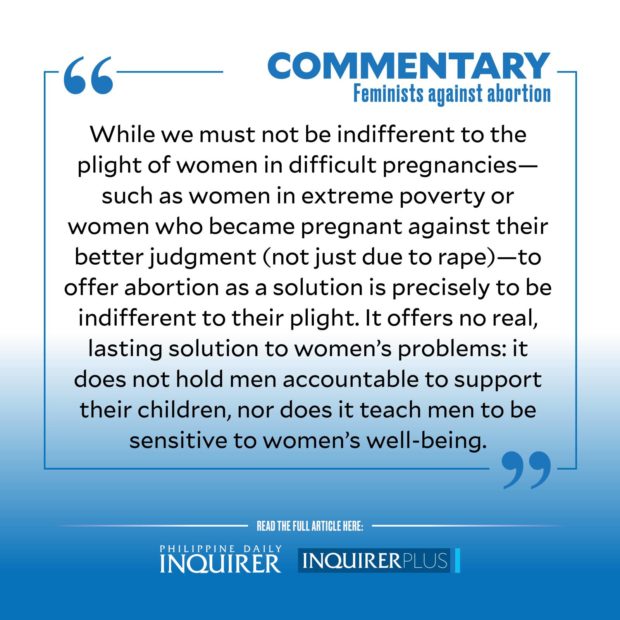When the US Supreme Court, in Dobbs v. Jackson Women’s Health Organization, last week overturned Roe v. Wade which, in 1973, invented a constitutional right to abortion, many protested and clamored for the protection of that invented right. The argument they invoked was “women’s rights.”
Feminists for Life, however, takes a different line. The group, which has successfully lobbied for laws in the US that streamline the collection of child support, expand penalties for child support delinquency, and enhance support systems for pregnant and parenting students, among others, views abortion as an oppression of women.
The group takes inspiration from pioneers of the women’s rights movement. One of them was Alice Paul, who authored the Equal Rights Amendment, that extended voting rights to women in 1920. Alice Paul continued to fight for women’s rights even after that, pushing for gender-equality statements in the UN Charter and in the 1964 Civil Rights Act. She became frustrated, however, with how the lobby for equal rights for women later became linked to abortion. “Abortion is the ultimate exploitation of women,” she told the founder of Feminists for Life.
Another source of inspiration for the group was Elizabeth Blackwell, the first woman to receive a medical degree from an American school and the first woman on the British medical register. She was originally not interested in becoming a doctor; among the things that changed her mind was her indignation that “female physician” was equated to “abortionist.” She wrote in her diary, in reaction to a news article about a notorious abortionist back then, “The gross perversion and destruction of motherhood by the abortionist filled me with indignation, and awakened active antagonism. That the honorable term ‘female physician’ should be exclusively applied to those women who carried on this shocking trade seemed to me a horror. It was an utter degradation of what might and should become a noble position for women … I finally determined to do what I could do ‘to redeem the hells,’ and especially the one form of hell thus forced upon my notice.”
Still another was Mattie Brinkerhoff, a lecturer on women’s suffrage. She wrote: “When a man steals to satisfy hunger, we may safely conclude that there is something wrong in society—so when a woman destroys the life of her unborn child, it is an evidence that either by education or circumstances she has been greatly wronged.”
The list goes on and on, showing the compatibility between championing women’s rights and opposing abortion.
It is traumatic for a woman to “have” to commit abortion, because there is nothing so opposed to womanhood as murder. Very well did Shakespeare make Lady Macbeth ask evil spirits, “[U]nsex me here,” to strengthen her resolve to commit murder. No woman wants to be a murderer, least of all the murderer of her own unborn child.
While we must not be indifferent to the plight of women in difficult pregnancies—such as women in extreme poverty or women who became pregnant against their better judgment (not just due to rape)—to offer abortion as a solution is precisely to be indifferent to their plight. It is to tell them, “Go ahead, kill your children so that the rest of us can go on with our lives,” instead of accompanying them. Worse, it offers no real, lasting solution to women’s problems: It does not hold men accountable to support their children, nor does it teach men to be sensitive to women’s well-being.
To be clear, I do not agree with all the positions of Feminists for Life on all issues. The group itself clarifies that its members have diverse positions on issues such as contraception and abstinence that are beyond this mission.
Nevertheless, we can learn from the approach that Feminists for Life takes toward abortion: that yes, one can advocate for the rights of both women and unborn babies.
Applying all of these to the Philippines, we have every reason to defend Article II, Section 12 of our Constitution which proclaims that the State “shall equally protect the life of the mother and the life of the unborn from conception,” together with Article II, Section 14 of the same Constitution which proclaims that the State “recognizes the role of women in nation-building, and shall ensure the fundamental equality before the law of women and men.”
We must do more for women. We also must do more for the unborn. We can do more for both, without sacrificing one for the other.
——————
Cristina A. Montes is a lawyer, legal scholar, and writer. She graduated AB Humanities, UA&P (1997); JD, UP College of Law (2005); Ll.M., Universidad de Navarra (2012), and JSD, San Beda University Graduate School of Law (candidate).
